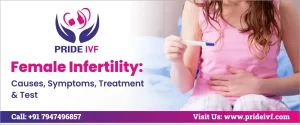Planning for a family is an exciting journey, but for women over 35, it can come with its unique challenges. As women age, female infertility naturally occurs, but this doesn’t mean that conceiving is impossible. Understanding how to increase fertility in women after 35 can make a significant difference. With the right approach, it’s entirely possible to increase fertility and improve the chances of a healthy pregnancy. This blog will provide practical tips and insights to help women over 35 enhance their fertility. Pride IVF Centre in Delhi is here to support you every step of the way.




Understanding Fertility After 35
Women are born with a finite number of eggs, and this number decreases with age. After 35, the decline becomes more pronounced, affecting both the quantity and quality of eggs. This can lead to difficulties in conceiving and a higher risk of genetic abnormalities. However, it’s a common misconception that 35 is too late to have a child. With modern medical advancements and lifestyle changes, many women successfully conceive and have healthy pregnancies well into their late 30s and beyond.
Lifestyle Modifications
Making certain lifestyle changes can significantly boost fertility (How To Boost Fertility In Your 30s). Here are some key areas to focus on:
Balanced Diet
A balanced diet plays a crucial role in improving infertility. Focus on including specific nutrients that are beneficial for fertility:
- Folic Acid: Essential for cell division and fetal development. It can be found in leafy green vegetables, legumes, and fortified cereals.
- Iron: Helps prevent anemia and supports a healthy pregnancy. Sources include lean meats, spinach, and beans.
- Zinc: Important for hormone regulation and ovulation. Found in nuts, seeds, and whole grains.
- B Vitamins: Vital for energy production and hormone balance. Include foods like whole grains, dairy, and eggs in your diet.
Regular Exercise
Regular physical activity can greatly benefit fertility. It helps maintain a healthy weight, improve circulation, and reduce stress, all of which are important for reproductive health. However, it’s important to strike a balance:
- Moderate Exercise: Activities like brisk walking, gentle yoga (Fertility Yoga Poses), and swimming can enhance overall well-being without putting excessive strain on the body.
- Avoid Excessive Workouts: High-intensity workouts can negatively impact fertility by disrupting hormonal balance. Stick to moderate, consistent exercise routines.
Avoiding Harmful Substances
Avoiding harmful substances is critical for improving fertility. Here’s why it’s important and what you can do:
- Smoking: Smoking is known to reduce fertility in both men and women. It accelerates egg loss and can lead to earlier menopause. Quitting smoking can significantly improve your chances of conception.
- Alcohol: Excessive alcohol consumption can interfere with ovulation and reduce fertility. Limiting alcohol intake or avoiding it altogether can be beneficial.
- Caffeine: High caffeine intake has been linked to reduced fertility. Instead of regular coffee, consider switching to herbal teas which can provide a soothing alternative without affecting fertility.
At International Pride IVF and Research Centre, we believe in a holistic approach to fertility and are here to support you in your journey to parenthood, especially when it comes to understanding how to increase fertility in women after 35.
Medical Interventions and Procedures
Fertility treatments can provide hope for couples struggling to conceive (tips for getting pregnant at 30-35). At clinics like International Pride IVF and Research Centre, various options are available to meet individual needs:
- In Vitro Fertilization (IVF): IVF involves stimulating the ovaries to produce eggs, retrieving them, fertilizing them in a lab, and transferring the embryos to the uterus. Success rates vary but can be promising, especially for women under 35. Patients can expect multiple appointments for monitoring and procedures throughout the cycle.
- Intrauterine Insemination (IUI): IUI involves placing sperm directly into the uterus around the time of ovulation. It’s a less invasive option with lower success rates compared to IVF but can be effective for certain cases.
- Egg Freezing: Egg freezing allows women to preserve their eggs for future use, benefiting those over 35 who may want to delay pregnancy due to personal or medical reasons.
- Donor Eggs: Using donor eggs is an option for women with low ovarian reserve or poor egg quality. Success rates are generally high, making it a recommended option for some.
- Hormonal Therapies: These treatments can help regulate menstrual cycles and improve ovulation, increasing the chances of conception.
Regular medical check-ups and fertility assessments are essential to monitor progress and adjust treatment plans as needed. By exploring these options and seeking professional guidance, couples can increase their chances of starting a family.
Lets get started
Stress Management
Managing stress is essential for enhancing fertility. Stress can negatively impact reproductive health. Incorporating mindfulness, yoga, and meditation into your daily routine can help alleviate stress. These practices promote relaxation and improve overall well-being, which can positively influence fertility. Additionally, seeking mental health support and counseling can provide valuable strategies for managing stress effectively. By prioritizing stress management, you can enhance your fertility and increase your chances of conceiving. Also Read: At What Age Should A Woman Stop Trying To Conceive.
Natural Supplements
In addition to lifestyle changes, certain supplements can support fertility. Folic acid, CoQ10, and omega-3 fatty acids are commonly recommended for their potential to boost reproductive health. However, it’s essential to consult a healthcare provider before starting any supplements. They can provide personalized advice based on your individual needs and ensure that you’re taking the right supplements in the appropriate dosages for optimal fertility support.
Importance of Sleep
Quality sleep plays a crucial role in maintaining hormonal balance and overall health, which can impact fertility. Here are some tips for improving sleep hygiene:
- Regular Sleep Schedule: Go to bed and wake up at the same time every day to regulate your body’s internal clock.
- Create a Restful Environment: Keep your bedroom cool, dark, and quiet. Consider using earplugs or a white noise machine if noise is a problem.
- Reduce Screen Time: Limit exposure to screens (phones, computers, TVs) before bed, as blue light can interfere with the production of the sleep hormone melatonin.
Partner’s Health
Male fertility plays a crucial role in conception, and partners need to address any potential issues. Encourage a healthy lifestyle for men, including a balanced diet rich in nutrients, avoiding exposure to toxins such as smoking and excessive alcohol, and maintaining regular exercise. Additionally, medical procedures such as semen analysis and fertility treatments are available to address any underlying issues and improve male fertility.
Conclusion
Increasing fertility after 35 is challenging but achievable with the right approach. Key strategies for how to increase fertility in women after 35 include making lifestyle changes, considering medical interventions, managing stress, and supporting both partners’ health. At International Pride IVF and Research Centre, we offer comprehensive care and advanced treatments to help you on your journey to parenthood. Contact us today to schedule a consultation and take the first step towards your dream of having a family.




